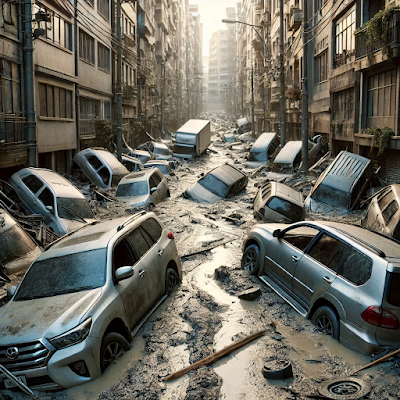Ante la catástrofe meteorológica del levante español me muerdo la lengua para guardarme mis opiniones y quejas ante la gestión de la misma así como mi dolor por los que la han sufrido en primera persona. Y ante la pregunta sobre qué podría hacer yo para ayudar, tras un tiempo de silencio y contemplación me pongo a pensar qué haría si esa gota fría hubiera caído en el municipio de Manzanares el Real donde trabajo como médico de familia.
En primer lugar constato que no tenemos ninguna experiencia en catástrofes, nunca han ocurrido, no hay plan de contingencia. Hubiera sido un desastre similar al que hemos visto.
En segundo compruebo que los recursos con los que cuenta un municipio de 9.000 habitantes no son muchos: ayuntamiento, policía local, puesto de la guardia civil, centro de salud, ambulancia municipal (ahora parada por motivos técnicos). Pero tenemos un hospital y bomberos a 23 minutos (Collado Villalba), otro hospital a 35 en coche (Madrid)… Si ocurriera algo probablemente tendríamos ayuda rápida. Pero ¿y si tuviéramos que manejarnos nosotros solos?
1. Tendríamos que organizar una coordinación básica entre ayuntamiento, policía, centro de salud con ramificaciones al resto de la comunidad y a la posible ayuda externa que pudiéramos recibir.
2. Tendríamos que pedir ayuda a los vecinos. Coordinar voluntarios, taxis, vehículos, cuadrillas. Reforzar protección civil.
3. Organizar refugio para acoger a quien no tuviera vivienda disponible (en polideportivo municipal por ejemplo).
4. Garantizar agua, alimentos, luz y comunicaciones.
5. Organizar un servicio de información para detectar desaparecidos, fallecidos o personas en riesgo grave.
6. Asistir a los más vulnerables: residencias de ancianos de la localidad, ancianos, enfermos u otras personas que vivan solos…
7. Acoger a los equipos de ayuda o voluntarios externos que pudieran venir. Darles apoyo e infraestructura así como facilitar en lo posible su labor.
Quizá esta catástrofe nos ofrezca a muchos la oportunidad de ayudar de forma material o de otras, pero también algo muy valioso como es aprender del enorme valor de una experiencia ajena muy costosa a nivel de dolor y pérdidas humanas y materiales. Por que tristemente vendrán más y en más lugares dada la situación de cambio climático que vivimos.
Sobre la mala gestión de las Comunidades Autónomas ante catástrofes no abundaré, dejo a criterio de cada cual la respuesta ante sus responsables políticos correspondientes, invitado, eso sí, a que no se priven de dirigirles cuantos mensajes, cartas, o demás consideren. Pero más allá de la queja traten de hacerse preguntas y piensen: ¿qué harían si la próxima vez les toca a ustedes?
What if next time it’s my turn?
In the face of the recent meteorological catastrophe in eastern Spain, I bite my tongue to hold back my opinions and complaints about how it has been handled, as well as my sorrow for those who have been affected firsthand. And when asked what I could do to help, after some time in silence and reflection, I begin to consider what I would do if such a cold front had struck the municipality of Manzanares el Real, where I work as a family doctor.
First of all, I note that we have no experience with disasters here; they’ve never happened before, and there’s no contingency plan. It would have been a disaster akin to what we’ve witnessed.
Secondly, I find that the resources available in a town of 9,000 residents are limited: the town hall, local police, a Civil Guard post, the health centre, and a municipal ambulance (currently out of service for technical reasons). We do, however, have a hospital and fire service 23 minutes away (in Collado Villalba), and another hospital 35 minutes away by car (in Madrid)… If anything were to happen, we would likely receive prompt assistance. But what if we had to cope on our own?
1. We’d need to establish basic coordination between the town hall, police, and health centre, extending out to the wider community and any external aid we might receive.
2. We would need to ask residents for help. Organise volunteers, taxis, vehicles, work crews. Strengthen civil protection.
3. Arrange for shelter to accommodate those without available housing (in the municipal sports centre, for example).
4. Ensure water, food, electricity, and communications.
5. Set up an information service to locate missing persons, report fatalities, or identify those in serious danger.
6. Provide care for the most vulnerable: local care homes, the elderly, the sick, or others living alone.
7. Accommodate any incoming aid teams or external volunteers. Provide support and infrastructure, as well as facilitate their work wherever possible.
Perhaps this catastrophe offers many of us the opportunity to help materially or otherwise, but also to gain something very valuable—the chance to learn from a costly experience, one filled with deep loss in terms of lives and property. For sadly, more such events will come to more places, given the climate change we are experiencing.
I won’t delve into the poor response from the autonomous communities in managing disasters; I leave it to each individual to assess their political leaders’ responses accordingly, while encouraging you to reach out to them with messages, letters, or any other feedback you deem appropriate. But beyond complaint, try asking yourself this: what would you do if next time it were you?
如果下一次轮到我该怎么办?
面对西班牙东部的气象灾害,我咬紧牙关,努力压抑住对灾害管理的意见和抱怨,以及对那些亲身经历了灾难的人们的痛苦。同样,当被问到我能做些什么来帮助时,在沉默与反思之后,我开始思考,如果这样一场冷锋天气出现在我工作所在的曼萨纳雷斯皇家市,我会怎么做?我是这里的一名家庭医生。
首先,我意识到我们这里没有任何灾害应对经验,从未发生过灾害,也没有应急计划。如果发生灾害,可能会是我们所看到的类似场景。
其次,我发现一个拥有9,000名居民的小镇资源有限:市政府、当地警察、国民警卫队哨所、卫生中心、还有一辆市政救护车(目前因技术原因停用)。不过,我们有一家距离23分钟的医院和消防队(在科亚多维亚尔瓦),另有一家医院距离35分钟车程(在马德里)……如果发生了灾害,我们可能会得到迅速的支援。但是,如果我们不得不自力更生呢?
1. 我们需要在市政府、警察、卫生中心之间建立基本的协调,并扩展到整个社区以及可能接收的外部援助。
2. 我们需要请求居民的帮助。协调志愿者、出租车、车辆、工作队伍,加强民防。
3. 安排避难所接纳无家可归者(比如在市立体育馆)。
4. 确保水、食物、电力和通讯的供应。
5. 组织信息服务,以寻找失踪人员、报告死亡情况或确认有严重危险的人。
6. 照顾最脆弱的人群:当地养老院、独居老人、病人或其他孤居人士。
7. 接待可能来的救援队或外部志愿者,为他们提供支持和基础设施,尽量为他们的工作提供便利。
这场灾难也许给我们许多人提供了帮助的机会,无论是物质上的还是其他方面的,但它也带来了一个非常宝贵的教训——我们可以从这场充满痛苦和损失的灾难中学习到许多。遗憾的是,由于我们所面临的气候变化,未来这样的灾难会在更多地方发生。
关于各自治区在灾难中的管理不善,我不打算详细评论。我留给大家去评估相关政治负责人,但我还是鼓励大家给他们发送您认为合适的信息、信件或反馈。然而,除了抱怨,还请问问自己:如果下一次轮到你,你会怎么做?
此翻译由ChatGPT完成,对于任何可能的翻译错误,我们深表歉意。

No hay comentarios:
Publicar un comentario